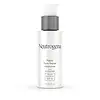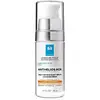What's inside
What's inside
 Key Ingredients
Key Ingredients

 Benefits
Benefits

 Concerns
Concerns

 Ingredients Side-by-side
Ingredients Side-by-side

Water
Skin ConditioningPentaerythrityl Tetraethylhexanoate
EmollientDimethicone
EmollientGlycerin
HumectantPPG-15 Stearyl Ether
EmollientCetearyl Alcohol
EmollientStearyl Alcohol
EmollientButylene Glycol
HumectantCeteareth-20
CleansingIsohexadecane
EmollientTrisiloxane
Skin ConditioningDimethicone Crosspolymer
Emulsion StabilisingPhenoxyethanol
PreservativeCaprylyl Glycol
EmollientAmmonium Acryloyldimethyltaurate/Vp Copolymer
Polyacrylamide
Polyethylene
AbrasiveParfum
MaskingC13-14 Isoparaffin
EmollientChlorphenesin
AntimicrobialPtfe
Hydrolyzed Myrtus Communis Leaf Extract
Skin ProtectingPolysorbate 20
EmulsifyingRetinol
Skin ConditioningBHT
AntioxidantAscorbic Acid
AntioxidantSodium Hyaluronate
HumectantDisodium EDTA
Laureth-7
EmulsifyingSodium Hydroxide
BufferingWater, Pentaerythrityl Tetraethylhexanoate, Dimethicone, Glycerin, PPG-15 Stearyl Ether, Cetearyl Alcohol, Stearyl Alcohol, Butylene Glycol, Ceteareth-20, Isohexadecane, Trisiloxane, Dimethicone Crosspolymer, Phenoxyethanol, Caprylyl Glycol, Ammonium Acryloyldimethyltaurate/Vp Copolymer, Polyacrylamide, Polyethylene, Parfum, C13-14 Isoparaffin, Chlorphenesin, Ptfe, Hydrolyzed Myrtus Communis Leaf Extract, Polysorbate 20, Retinol, BHT, Ascorbic Acid, Sodium Hyaluronate, Disodium EDTA, Laureth-7, Sodium Hydroxide
Butyl Methoxydibenzoylmethane 2.68%
UV AbsorberHomosalate 9.6%
Skin ConditioningEthylhexyl Salicylate 2.88%
UV AbsorberOctocrylene 5.38%
UV AbsorberBenzophenone-3 3.46%
UV AbsorberWater
Skin ConditioningDimethicone
EmollientCyclopentasiloxane
EmollientTocopherol
AntioxidantAcrylates/Dimethicone Copolymer
Skin ConditioningPhenoxyethanol
PreservativePropylene Glycol
HumectantCaprylyl Glycol
EmollientSilica
AbrasiveSodium Polyacrylate
AbsorbentAscorbyl Glucoside
AntioxidantScutellaria Baicalensis Root Extract
AstringentAcrylates/C10-30 Alkyl Acrylate Crosspolymer
Emulsion StabilisingDisodium EDTA
Diethylhexyl Syringylidenemalonate
Skin ProtectingPolyacrylamide
C13-14 Isoparaffin
EmollientLaureth-7
EmulsifyingCassia Alata Leaf Extract
AstringentMaltodextrin
AbsorbentTriethanolamine
BufferingButyl Methoxydibenzoylmethane 2.68%, Homosalate 9.6%, Ethylhexyl Salicylate 2.88%, Octocrylene 5.38%, Benzophenone-3 3.46%, Water, Dimethicone, Cyclopentasiloxane, Tocopherol, Acrylates/Dimethicone Copolymer, Phenoxyethanol, Propylene Glycol, Caprylyl Glycol, Silica, Sodium Polyacrylate, Ascorbyl Glucoside, Scutellaria Baicalensis Root Extract, Acrylates/C10-30 Alkyl Acrylate Crosspolymer, Disodium EDTA, Diethylhexyl Syringylidenemalonate, Polyacrylamide, C13-14 Isoparaffin, Laureth-7, Cassia Alata Leaf Extract, Maltodextrin, Triethanolamine
 Reviews
Reviews

Ingredients Explained
These ingredients are found in both products.
Ingredients higher up in an ingredient list are typically present in a larger amount.
This ingredient is also known as "C13-14 Isoalkane".
C13-14 Isoparaffin is created from petroleum-based mineral oils. It is an emollient and helps thicken a product.
As an emollient, it helps keep the skin soft and smooth by creating a barrier on top. This barrier traps moisture in, keeping the skin hydrated.
C13-14 Isoparaffin may not be fungal-acne safe.
Learn more about C13-14 IsoparaffinCaprylyl Glycol is a humectant and emollient, meaning it attracts and preserves moisture.
It is a common ingredient in many products, especially those designed to hydrate skin. The primary benefits are retaining moisture, skin softening, and promoting a healthy skin barrier.
Though Caprylyl Glycol is an alcohol derived from fatty acids, it is not the kind that can dry out skin.
This ingredient is also used as a preservative to extend the life of products. It has slight antimicrobial properties.
Learn more about Caprylyl GlycolDimethicone is a type of synthetic silicone created from natural materials such as quartz.
What it does:
Dimethicone comes in different viscosities:
Depending on the viscosity, dimethicone has different properties.
Ingredients lists don't always show which type is used, so we recommend reaching out to the brand if you have questions about the viscosity.
This ingredient is unlikely to cause irritation because it does not get absorbed into skin. However, people with silicone allergies should be careful about using this ingredient.
Note: Dimethicone may contribute to pilling. This is because it is not oil or water soluble, so pilling may occur when layered with products. When mixed with heavy oils in a formula, the outcome is also quite greasy.
Learn more about DimethiconeDisodium EDTA plays a role in making products more stable by aiding other preservatives.
It is a chelating agent, meaning it neutralizes metal ions that may be found in a product.
Disodium EDTA is a salt of edetic acid and is found to be safe in cosmetic ingredients.
Learn more about Disodium EDTALaureth-7 is created by the ethoxylation of lauryl alcohol using ethylene oxide. Lauryl alcohol is a fatty alcohol with hydrating properties.
This ingredient is an emulsifier and cleansing ingredient. As an emulsifier, it is used to prevent ingredients from separating. It also helps cleanse the skin by gathering dirt, oil, and pollutants to be rinsed away.
Phenoxyethanol is a preservative that has germicide, antimicrobial, and aromatic properties. Studies show that phenoxyethanol can prevent microbial growth. By itself, it has a scent that is similar to that of a rose.
It's often used in formulations along with Caprylyl Glycol to preserve the shelf life of products.
Polyacrylamide is a synthetic polymer. It is used to stabilize products and bind ingredients. When hydrated, Polyacrylamide forms a soft gel.
Polyacrylamide is low-toxicity. If source properly, it is deemed safe to use in cosmetics.
It should be noted the precursor to Polyacrylamide is acrylamide. Acrylamide is a carcinogen. Most reputable sources of Polyacrylamide will screen for residual acrylamide to make sure the count is in a safe range. Acrylamide is not able to be absorbed through the skin.
We recommend speaking with a professional if you have concerns.
Learn more about PolyacrylamideWater. It's the most common cosmetic ingredient of all. You'll usually see it at the top of ingredient lists, meaning that it makes up the largest part of the product.
So why is it so popular? Water most often acts as a solvent - this means that it helps dissolve other ingredients into the formulation.
You'll also recognize water as that liquid we all need to stay alive. If you see this, drink a glass of water. Stay hydrated!
Learn more about Water